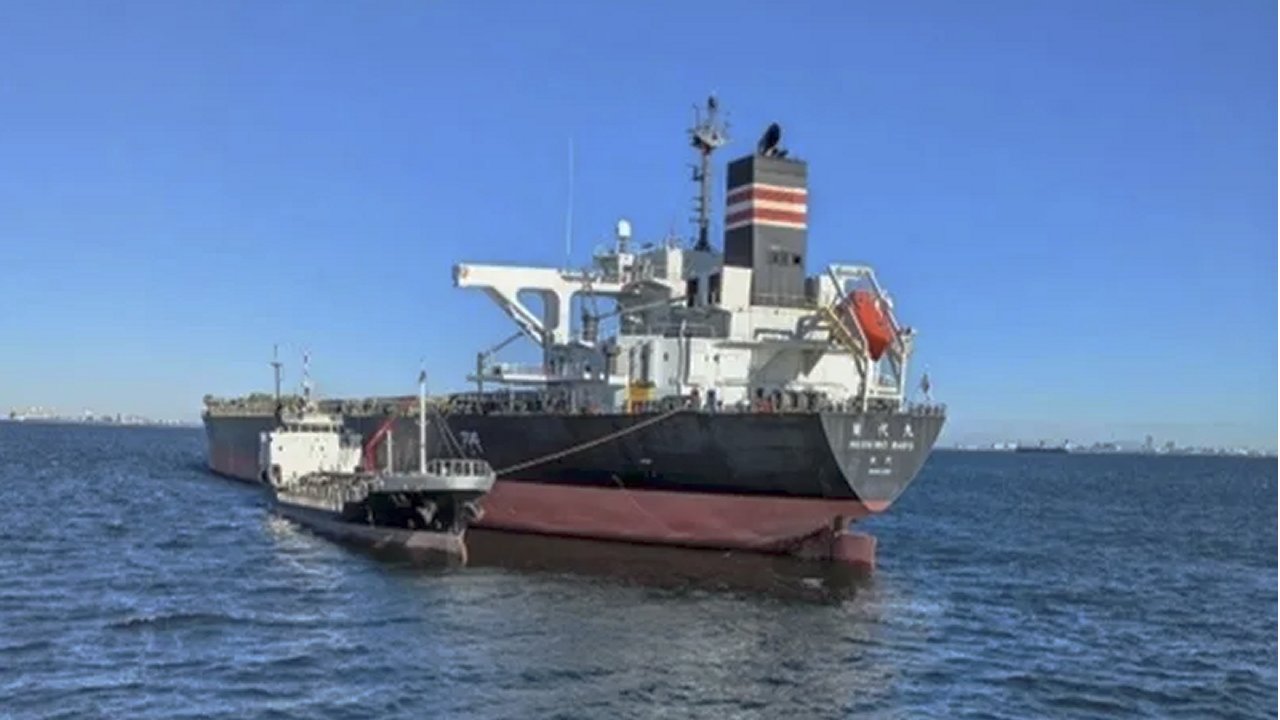
 |
On February 9, NYK Line embarked on a landmark test run involving biofuel on its coal carrier, the Noshiro Maru, which is operated for Tohoku Electric Power. It was the first time in Japan that a coal carrier was used to test biofuel for a domestic utility company.
The delivery of biofuel to the vessel was performed by Mitsubishi Corporation Energy Co., Ltd in the country's Keihin region - an area which covers Tokyo, Kawasaki, and Yokohama.
Biofuels are derived from organic resources, or biomass, such as agricultural residues and waste cooking oil. When combusted, they are considered to produce virtually zero carbon dioxide (CO2) emissions. Their compatibility with heavy-fuel-powered engines — predominant among large merchant vessels — positions biofuels as a pivotal option for reducing greenhouse gas (GHG) emissions during the critical transition from heavy oil to zero-emission fuels.
Moreover, utilising biofuels for navigation purposes plays a role in reducing Scope 3 GHG emissions linked to transporting customers' cargo. NYK has expressed its commitment to promoting decarbonization within marine transport by focusing on integrating biofuels and other next-generation fuels into its operations. The company emphasises that adjusting to biofuels not only aligns with regulatory efforts but also contributes significantly to lowering GHG emissions across customers' entire supply chains.
As the maritime industry faces increasing pressure to reduce its carbon footprint, initiatives like NYK's biofuel test run demonstrate tangible steps toward sustainable practices. Although biofuels emit CO2 during combustion, the lifecycle of these fuels — where plants absorb CO2 while growing — offers a pathway to what is termed carbon neutrality. This aspect makes biofuels a promising alternative to conventional fossil fuels, potentially mitigating the environmental impact of marine transportation.

|
World Shipping Council backs EU maritime strategies but calls for faster trade simplification
Industry body supports port security and decarbonisation measures while urging action on customs barriers. |
|
|
|
||

|
Anemoi and Lloyd’s Register call for unified approach to wind propulsion performance verification
Anemoi Marine Technologies and Lloyd’s Register publish paper advocating alignment of verification methodologies. |
|
|
|
||

|
Smyril Line's methanol-ready ro-ro launched in China
First of two 3,300 lane-metre vessels floated out for Faroese operator. |
|
|
|
||

|
ICS webinar explores regulatory framework for nuclear-powered merchant ships
Industry experts discuss the timeline and challenges for adopting nuclear propulsion in the commercial shipping sector. |
|
|
|
||

|
Oilmar DMCC seeks senior bunker trader for Dubai office
Dubai-based energy trader recruiting for Middle East, Indian subcontinent and Africa trade flows. |
|
|
|
||

|
Oilmar DMCC seeks bunker traders for Singapore office
Dubai-based trader recruiting mid-level and senior professionals to expand Asia-Pacific marine fuels operations. |
|
|
|
||

|
ClassNK updates EU shipping emissions guidance for LNG-fuelled vessels
Japanese classification society releases revised FAQs addressing methane slip measurement procedures. |
|
|
|
||

|
Bureau Veritas delivers first 15,000-teu methanol dual-fuel container ship for CMA CGM
Classification society completes delivery of CMA CGM Monte Cristo built by DSIC Tianjin. |
|
|
|
||

|
IBIA announces new date for mass flow meter training course in Rotterdam
Training scheduled for 12 May follows mandatory MFM implementation at Rotterdam and Antwerp-Bruges ports. |
|
|
|
||

|
Maersk and Hapag-Lloyd suspend Strait of Hormuz transits amid Middle East security crisis
Container carriers reroute services around the Cape of Good Hope as military conflict escalates. |
|
|
|
||
| Petrobras secures ISCC EU RED certification for B24 biofuel blend at Rio Grande [News & Insights] |